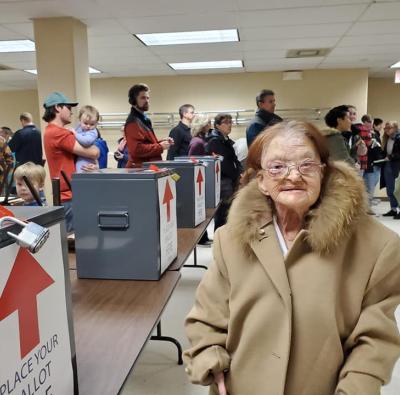As public health precautions around the coronavirus pandemic continues to cause disruptions and delays to the ongoing primary elections, states must take steps now to ensure that the general election in November runs smoothly. Voters should not have to choose between public health and a functioning democracy.
The date of the general election is mandated by federal law, and the start and end dates of congressional and presidential terms are set by the Constitution. Only an Act of Congress could move the presidential general election—so we need to start preparing all the measures that will be needed to enable voters to cast their votes on or before November 3, 2020.
We Can Ensure Voting Access in November.
We can ensure a safe and accessible election on November 3, 2020 but that requires concerted action by officials at all levels of government now. Common sense electoral reforms can provide Americans with safe and easy access to the ballot even in these uncertain times.
Ensure Adequate Funding (at least $2 billion)
Federal, state, and local governments need to ensure election officials have adequate funding to implement the following policies in time for the November 2020 election. That funding must be allocated now so that election officials can begin making necessary preparations and must begin from the top with allocations from Congress. At least $2 billion in funding is necessary to safeguard our elections; that is a bargain when nothing less than our democracy is at stake. The $400 million in the phase three stimulus bill is only a down payment on this necessary funding.
Expand Voter Registration Options
Given the ongoing crisis, voters will face more difficulties registering to vote. Voter registration drives are a crucial means of voter registration for minority communities and will be eliminated or significantly curtailed during the pandemic. To alleviate these difficulties, all states should offer expanded voter registration options, including online voter registration and same-day voter registration.
Online voter registration will provide citizens with a safe and secure method to register to vote remotely. It should be available in all 50 states and territories. States must start the implementation and assessment of systems now to ensure that they are fully accessible and easy to navigate for all eligible voters. States should also extend voter registration deadlines to accommodate any unforeseen circumstances or technical difficulties.
Extend Early Voting
States should offer and expand early voting options, including at least one weekend. By spreading out in-person voting across many days—rather than a single day—we can space out voters and alleviate long lines and crowded polling locations.
Make Vote by Mail Options Available to All Voters
Expansion of vote by mail will ensure that most Americans can vote from the safety of their own homes. All voters should have the option to request a no-excuse mail-in ballot that can be returned by mail or dropped off at a secure location. Voters should be permitted to request these ballots online, by mail, or by phone, and states should provide envelopes with prepaid postage for return by mail. States should also extend the deadlines for requesting and returning mail-in ballots to accept all mail-in ballots postmarked by Election Day. States must also allow mail ballots to be dropped off at designated drop box locations and ensure those locations provide equal access for minority communities.
States must also eliminate any witness signature or notarization requirement for mail ballots and must not reject these ballots for immaterial technical errors. If any mail ballot has a signature match issue or other technical error, states must ensure that voters receive notice and a meaningful opportunity to cure the error with options that do not require travel to a government office.
Ensure In-Person Voting Continues Safely and Equitably
As states expand options to vote by mail, they must do so in a way that does not inadvertently disenfranchise communities of voters for whom vote by mail is not a reliable option. In-person voting is necessary for many voters with disabilities, voters with language-assistance needs, and voters without reliable mail service such as Native Americans living on reservations. Moreover, many communities of color rely extensively on in-person voting. States must maintain in-person voting options for those voters.
States can prepare now to ensure safe and equitable in-person voting by recruiting a larger number of poll workers and recruiting a diverse pool of poll workers outside the demographics most at-risk of contracting coronavirus. Ensuring that there are adequate and safe polling locations—equitably distributed across communities—and confirming that those locations are equitably and properly resourced with adequate machines and staff will minimize wait times, shorten lines, and minimize the risk for both voters and poll workers.
Voter Education and Combating Misinformation
Federal, state and local governments should work to make sure the public receives up-to-date information on any changes to election procedures and expanded opportunities to access the ballot. Extensive voter education campaigns will be required to inform voters as states make the necessary changes to ensure that the November election suns smoothly.
Extensive voter education is also required to combat misinformation campaigns on social media. Foreign governments and wealthy special interests have a demonstrated history of running election ads that are deliberately misleading and intended to disrupt or discourage voting. Social media platforms need to take affirmative steps to block misuse of their systems and make sure voters know which groups are behind these ads. Congress and state legislatures must pass laws, such as the bipartisan Honest Ads Act, that give voters access to information about who is trying to influence their votes online.
Hear two local election officials explain what voters should know about voting in 2020:

